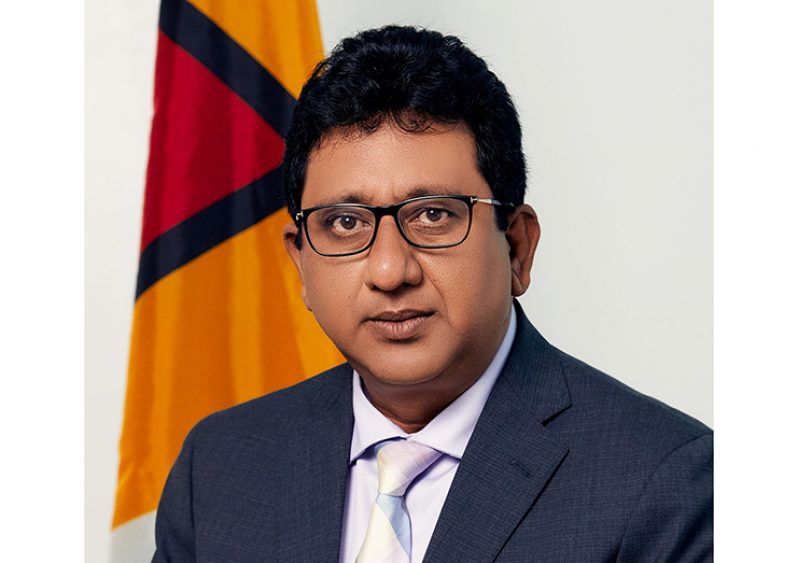-But ramifications must first be considered, AG says
By Richard Bhainie
WHILE agreeing that the country’s intellectual property rights legislation is outdated, Attorney General and Minister of Legal Affairs Anil Nandlall said the anticipated social and financial ramifications are largely to blame for the delayed attempt to modernise it.
During an interview with the Guyana Chronicle last Wednesday, Nandlall noted that intellectual property is an important issue to government, but it has to be treated with care, given the implications involved.

“Our legislative framework when it comes to intellectual property is archaic. It is impossible for one to say otherwise…copyright and intellectual property generally is [sic] a concept that we respect as a government, the importance of it and the need to protect the intellectual premise and products of all citizens,” he noted.
However, he explained that certain legislation has social and economic ramifications, and the main reason that has caused the delay to move ahead with reforming the legislation is the social and financial implications that would arise from its implementation.
“A society must be careful in the type of laws that it promulgates. It cannot, it should not promulgate laws that will impose hardships on the majority of its citizens. It should not promote laws which do not meet the aspirations and the way of life of a majority of its citizens,” Nandlall explained.
“A DVD for example will have to be sold for approximately $20 USD which is above the [daily] minimum wage in Guyana,” he said to further emphasise his point.
He noted that a law should not be imposed if the society by a majority will not comply with it. Enforcement becomes impossible and the law becomes futile.
“The rule of law as an institution so important for peace, order and good governance becomes undermined and the entire society becomes threatened,” Nandlall explained.
According to the World Intellectual Property Organization (WIPO), “Intellectual property (IP) refers to creations of the mind, such as inventions; literary and artistic works; designs; and symbols, names and images used in commerce.”
Copyright is a form of intellectual property, primarily used by authors and artists. Copyright covers the expressions of ideas such as books, music, works of art and films. It is used to protect the creators of original works and to prevent unauthorised use of those works, particularly for commercial gain.
TIME FOR MODERN LAW
Meanwhile, President of the Guyana Bar Association, Teni Housty, said there is need for modern legislation to ensure the protection of those in the creative industry.
In an interview last Monday, he informed this newspaper that the current legislation which governs copyright in Guyana is the United Kingdom’s Copyright Act 1956 that was incorporated into Guyana’s jurisprudence by the Copyright (‘British Guiana’) Order 1966.
Housty, a prominent attorney-at-law and lecturer on intellectual property rights at the University of Guyana, explained that Guyana is also a signatory to the Berne Convention, and a member of the World Trade Organization which places some obligations on Guyana to meet some minimum international standards.

“The Copyright Act 1956 would offer the type of copyright recognition and protection that existed in 1956, what that means is that the types of works that were recognised by the Copyright Act 1956 are the same types of works that are still recognised,” he said.
Accordingly, it was explained that for content to be recognised as having copyright protection, the test of originality must be satisfied, and it must be in a material form.
“Fortunately, the fundamental requirements of originality have not changed; it is just that the categories of works or the types of works have expanded,” he said.
Housty stressed that in Guyana’s case there is no modernity.
“Imagine taking a 2020 work and sticking it into what the law recognised in 1956 and that’s the problem, our creators’ works don’t fit into the traditional form that was recognised,” he said.
It is necessary to reform the copyright legislation for creators and their works to be recognised by the law, which will allow them to protect their rights and if they choose to generate incomes from their work, they may be able to do so.
“What copyright does, is it gives you the right to authorise the reproduction of your work and also stop [the] unauthorised reproduction of your work; so by reproducing somebody’s work they’re entitled to something for that. Each time a reproduction occurs, a financial royalty is payable to the rights holder,” Housty explained.
“Our idea of copyright is a Western approach: recognise the work and make money from it. However, creativity is around the world and people create for different reasons, but what people should be given is the opportunity to say whether or not they want to make money from it or not and feel comfortable in that process,” he said.
For Housty, the modern copyright legislation would “reflect an expansion of the category of works recognised, a lack of distinction in form, the challenges and opportunities that digital technology would provide, an easier mechanism to enforce breaches as they occur and it [would] recognise combinations of new forms of work.”
NO GUIDELINES
Musician and recording artiste at Kross Kolor Records, Gavin Mendonca, told this publication last Thursday that after performing internationally one of the observations he made in relation to Guyana is that there is a “lackadaisical culture” towards creatives.
“We don’t follow any sort of guidelines in relation to copyrights, how content is published, how rights are assigned and how rights are licensed,” he explained.
Guyana is also not a copyright registration country, which makes it difficult for creators to assert their rights.
In the music industry, when a song is registered with a rights organisation, a code known as an International Standard Recording Code (ISRC) is embedded into the music file, and once that file is distributed anywhere in the world the song count is recorded. Based on the amount of plays it would generate royalties.
Guyana’s regional neighbour Trinidad and Tobago (T&T) has a rights organisation known as Copyright Organisation of Trinidad and Togabo (COTT), a non-profit organisation that represents people in the music industry in T&T. It administers the public performance, broadcasting, communication to the public, mechanical reproduction and synchronisation rights granted by law to the creators and owners of original music.
Mendonca explained that “because of the lack of an organisation such as COTT to govern the enforcement of copyright laws, we don’t get to benefit from services such as Spotify, because those services are blocked here in Guyana due to our copyright laws.”
Several previous attempts by the Guyana Music Network to form such an organisation were not successful.
Apart from the lack of a rights-management committee, Guyana has developed a culture of piracy and the Guyanese society has failed to recognise the value of creators’ work.
As a consequence of this, creators are hesitant to produce content in Guyana.



.jpg)








